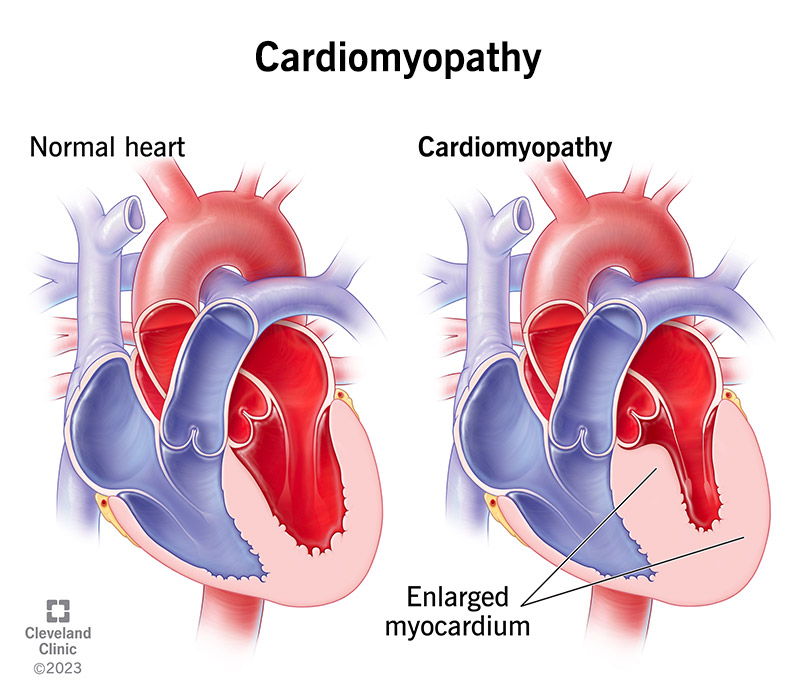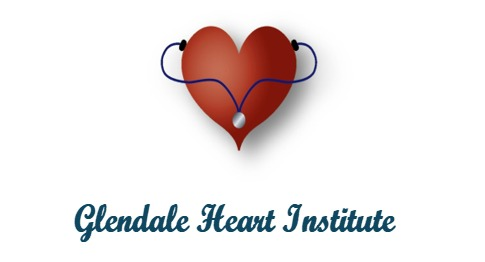
Cardiomyopathy (KAR-de-o-mi-OP-ah-thee) refers to diseases of the heart muscle. These diseases have many causes, signs and symptoms, and treatments.In cardiomyopathy, the heart muscle becomes enlarged, thick, or rigid. In rare cases, the muscle tissue in the heart is replaced with scar tissue.As cardiomyopathy worsens, the heart becomes weaker. It’s less able to pump blood through the body and maintain a normal electrical rhythm. This can lead to heart failure or irregular heartbeats called arrhythmias (ah-RITH-me-ahs). In turn, heart failure can cause fluid to build up in the lungs, ankles, feet, legs, or abdomen.The weakening of the heart also can cause other complications, such as heart valve problems.OverviewThe main types of cardiomyopathy are Dilated cardiomyopathy Hypertrophic (hi-per-TROF-ik) cardiomyopathy Restrictive cardiomyopathy Arrhythmogenic (ah-rith-mo-JEN-ik) right ventricular dysplasia (dis-PLA-ze-ah)Other types of cardiomyopathy sometimes are referred to as “unclassified cardiomyopathy.”Cardiomyopathy can be acquired or inherited. “Acquired” means you aren’t born with the disease, but you develop it due to another disease, condition, or factor. “Inherited” means your parents passed the gene for the disease on to you. Many times, the cause of cardiomyopathy isn’t known. Cardiomyopathy can affect people of all ages. However, people in certain age groups are more likely to have certain types of cardiomyopathy. This article focuses on cardiomyopathy in adults.How is Cardiomyopathy Diagnosed?Your doctor will diagnose cardiomyopathy based on your medical and family histories, a physical exam, and the results from tests and procedures.Specialists InvolvedOften, a cardiologist or pediatric cardiologist diagnoses and treats cardiomyopathy. A cardiologist specializes in diagnosing and treating heart diseases. A pediatric cardiologist is a cardiologist who treats children.Medical and Family HistoriesYour doctor will want to learn about your medical history. He or she will want to know what signs and symptoms you have and how long you’ve had them.Your doctor also will want to know whether anyone in your family has had cardiomyopathy, heart failure, or sudden cardiac arrest.Physical ExamYour doctor will use a stethoscope to listen to your heart and lungs for sounds that may suggest cardiomyopathy. These sounds may even suggest a certain type of the disease. For example, the loudness, timing, and location of a heart murmur may suggest obstructive hypertrophic cardiomyopathy. A “crackling” sound in the lungs may be a sign of heart failure. (Heart failure often develops in the later stages of cardiomyopathy.)Physical signs also help your doctor diagnose cardiomyopathy. Swelling of the ankles, feet, legs, abdomen, or veins in your neck suggests fluid buildup, a sign of heart failure.Your doctor may notice signs and symptoms of cardiomyopathy during a routine exam. For example, he or she may hear a heart murmur, or you may have abnormal test results.Diagnostic TestsYour doctor may recommend one or more of the following tests to diagnose cardiomyopathy.Blood TestsDuring a blood test, a small amount of blood is taken from your body. It’s often drawn from a vein in your arm using a needle. The procedure usually is quick and easy, although it may cause some short-term discomfort. Blood tests give your doctor information about your heart and help rule out other conditions.Chest X RayA chest x ray takes pictures of the organs and structures inside your chest, such as your heart, lungs, and blood vessels. This test can show whether your heart is enlarged. A chest x ray also can show whether fluid is building up in your lungs.EKG (Electrocardiogram)An EKG is a simple test that records the heart’s electrical activity. The test shows how fast the heart is beating and its rhythm (steady or irregular). An EKG also records the strength and timing of electrical signals as they pass through each part of the heart. This test is used to detect and study many heart problems, such as heart attacks,arrhythmias (irregular heartbeats), and heart failure. EKG results also can suggest other disorders that affect heart function.A standard EKG only records the heartbeat for a few seconds. It won’t detect problems that don’t happen during the test. To diagnose heart problems that come and go, your doctor may have you wear a portable EKG monitor. The two most common types of portable EKGs are Holter and event monitors.

